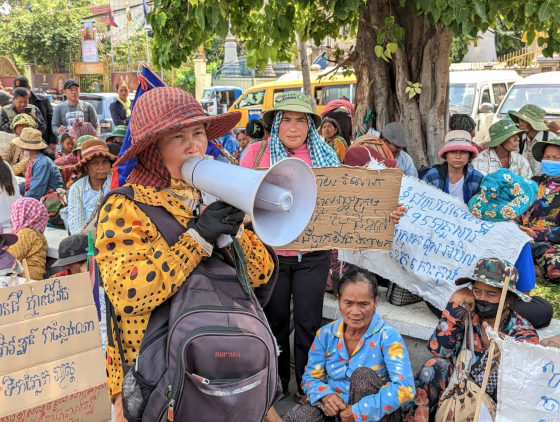
Huor and other community members across three provinces visited Hun Sen’s Cabinet to call for a resolution to their long-running land disputes.

Land and debtors' rights activist (197 Land Community), Koh Kong province
Cambodians hold the most microfinance debt per capita in the world. The average microloan is more than four times larger than the country’s median annual income, and a lack of regulation has allowed banks and microfinance institutions (MFIs) to generate profit at the expense of customers’ rights.
Years of predatory and reckless lending have created a debt crisis and human rights catastrophe. Systematic threats and intimidation are widely used by credit officers to shame or scare borrowers into selling land outside of the legal system, thus sparing MFIs and banks the hassle of collection proceedings. Land ownership is crucial to Cambodians’ survival, as it is key to their fundamental rights to food, housing, livelihoods, and more. Yet, more than 160,000 borrowers in Cambodia have sold land to repay microloans in the past five years – equal to one land sale every 16 minutes.
I want the banks and MFIs to extend repayment periods and decrease the interest rates so that people can afford to repay. And to the banks: please do not seize their houses and property
Det Huor is an activist and representative of 197 Land Community in Chi Kha Leu commune, within Koh Kong province. Huor began as a land rights defender, working with her community to resist encroachment on their land from a politically connected company. Since then, she has expanded her activism to resisting the rapacious and illegal tactics of banks and MFIs, which have ravaged her community.
Huor explains how predatory lending causes poverty in the community. Despite the scarcity of work, and their underprivileged backgrounds, borrowers are still granted vast loans. Many inevitably experience difficulties making repayment. It is in this way that many of Huor’s community members find themselves trapped in debt, which ends with them losing their land, or taking out more microloans to support their livelihoods and pay for their children’s education. As a result, they lose even more land, and become unable to farm or earn a living. Huor has seen people forced to sell land and take their children out of school to make microloan repayments. “My children stopped studying because of our limited livelihoods,” says Huor. “I want my community to understand more about debtors’ rights.” She adds that the effect of the COVID-19 pandemic increased the difficulties faced by factory workers in particular, many of whom went unpaid.
Huor and her community plead with lenders to extend repayment deadlines, emphasising the personal difficulties experienced by the borrowers, many of whom are sick and are simply unable to repay the enormous loans granted by MFIs. Huor also stresses the community’s willingness to adhere to any specific conditions or terms: “We are honest debtors.”
Huor speaks at her home in Koh Kong province.
Land loss and predatory lending affect many communities in Cambodia, but few have strong representatives like Huor to help protect community members’ rights. “I got involved in human rights work because I became involved in a land dispute,” says Huor. The dispute covers around 120 hectares and involves a company linked to Heng Huy, a Cambodian tycoon tied to several businesses involved in land disputes across Cambodia.
Using a Khmer idiom, Huor says that she and her community were warned “not to use an egg to hit a stone”, and that it was apparent that the company, aided by authorities, did not want to deal with protesters. “We were shocked to see his bodyguards, and the excavators used to encroach on our land. We were really afraid. Our people did not know the law, so we were afraid of him.”
Huor has seen people forced to sell land and take their children out of school to make microloan repayments.
Huor has been attacked as a direct consequence of her activism. “When we protested, we were beaten by authorities and parapolice. Some have become mentally ill and suffer chronic illnesses even today.” Both she and her husband have fallen ill from the stress caused by enduring threats and intimidation from authorities about the land dispute. Huor reports that other community members continue to suffer.
In 2019, Huor and nine other community representatives were charged with “malicious denunciation” and “incitement to disturb social security” for defending their land rights. The trial took place in April 2022, and the verdict remains pending. Furthermore, in July 2022, Huor was convicted of “malicious denunciation” and “defamation” for a September 2021 Facebook post, following a complaint made by Heng Huy. She was sentenced to one year’s imprisonment and a 2 million riel fine (approximately $500 USD), which was reduced to 6 months’ imprisonment and a 1 million riel fine by the Sihanoukville Appeal Court in October 2022. Huor has appealed her convictions to the Supreme Court. “These charges are unacceptable,” says Huor. “We would like the government to urge the court to drop the charges […] to provide a transparent and independent judgment.”

Huor and other community members across three provinces visited Hun Sen’s Cabinet to call for a resolution to their long-running land disputes.
Despite the attacks, Huor continues her activism regarding both land and MFI issues, and she hopes that the banks and MFIs offering loans in her community improve their practices. “I’m concerned that in the future, more people will take on debt that will cause them to lose their remaining land. I want the banks and MFIs to extend repayment periods and decrease the interest rates so that people can afford to repay. And to the banks: please do not seize their houses and property.”
More on MFIs: LICADHO has published four reports on MFI abuses in Cambodia since 2019. The most recent report, “Right to Relief”, was co-published in 2021 alongside Equitable Cambodia (EC) and interviewed more than 170 borrowers across 14 Cambodian communities. Further material on this topic is available here.